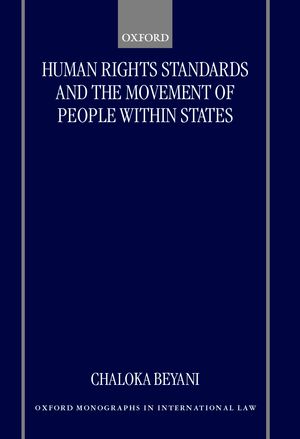
Human Rights Standards and the Movement of People Within States is an exposition of the standards of human rights which are applicable to the right of freedom of movement and residence of people within states. Written from the standpoint of international law, the book identifies these standards and examines their application to various categories of people, including nationals, non-nationals, minorities, and indigenous groups.;The primary motive for writing this book lies in the fact that the vast majority of people move and reside within states. People's ability to exercise civil and political rights as well as economic, social, and cultural rights within states generally depend in large measure on their ability to move about and to choose a place of residence within states. Freedom of movement is therefore crucial to the protection and enjoyment of other rights.;As a consequence, the protection of freedom of movement cannot be left exclusively to domestic legal systems because many legal systems form the basis for denying people the right of free movement. Yet the extent to which freedom of movement within states is protected by human rights under international law has not received the attention that its importance deserves. Particular problems arise from the ordinary regulation of freedom of movement, internal exile, the development of free movement zones for nationals and third country nationals in economic and political unions, the need to protect the movement of minorities and indigenous peoples, the movement and location of refugees within states, as well as the legality of derogation from freedom of movement during states of emergency.